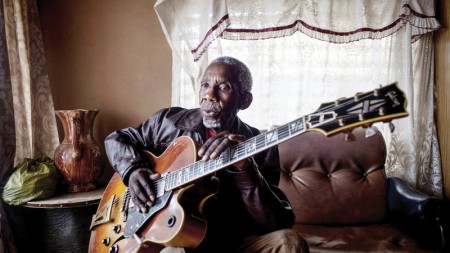Remembering Dr Philip Nchipi Tabane
Titus Mbuya | Friday May 25, 2018 14:09


The purpose of the journey was to attend the installation of Nyalala Pilane as the kgosi of Bakgatla-ba-ga-Kgafela in South Africa. My friends, Butler Phirie, Lesedi Seitei and Pius Molefhe, had been invited to the event on the basis of being Nyalala’s contemporaries and fellow tribesmen.
On arrival at Moruleng we were directed to one of the lodges in the village where we would put up for the night ahead of the installation the following day. It so happened that the same place was actually the venue of a series of cultural entertainment activities as part of the build-up to the installation ceremony.
There were traditional dance troupes and poets doing their own thing at the main hall within the precinct of the lodge. Little did we know that the main act that night was going to be none other than the legendary Philip Tabane. We were beside ourselves with joy after confirming that indeed he was around, and we could not wait to see him on stage.
The compere that evening was popular former Radio Bop DJ, Lawrence Dube. Then the time came for him to introduce the man of the moment, the inimitable Dr Philip Nchipi Tabane himself. The ecstatic audience gave him a standing ovation as he emerged on stage carrying his Gibson Super 500 guitar followed by his band members. The unassuming Tabane acknowledged the crowd and got down to business.
It was an unforgettable performance by the virtuoso guitarist, alongside percussionist, Raymond Motau and two others. Occasionally, Tabane switched from the guitar to the penny-whistle (flute), an instrument that was made popular by another South African legend, Spokes Mashiane.
The audience was relatively small as many people had started trickling out as Tabane was about to take to the stage. Most of them did not even know who Philip Tabane was. It turns out he had actually been around the venue, but because of his modesty and humility many people did not recognise him. Even as he was playing others were seated outside and drinking from their cars with friends.
The only department that did not measure up to its usual self that evening, in terms of the band personnel, was drums. From the 1960s when he formed his band Malombo, Tabane’s music was built around the robust yet defiant sound of his guitar and the pulsating sound and rhythm of the Venda cowhide drums. His antics on stage with his nephew, Gabriel Mabi Thobejane, the drummer-cum percussionist, is the stuff of legend in the South African music scene.
Before Thobejane, it was Julian Bahula, of Jabula fame, who played the drums for Malombo. Over the last few years, Philip Tabane’s son, Thabang, has been the drummer for his father’s band. Not only has he maintained the tradition of Malombo sound, but he has infused exuberance into it, as a youth, turning Tabane’s music into an even more tantalising experience.
Bahula co-founded Malombo with Tabane and another in 1964. That same year they won first prize at the Castle Laager Jazz Festival held at Orlando Stadium, Soweto. That achievement was described as a magical and defining moment in the history of South African jazz, an event that underscored Malombo as the best and most innovative jazz combo in the country.
Philip Tabane’s music, especially in this part of the world was popularised, amongst others, by the defunct Radio Bop Afro Beat show, ‘Moribo wa Afrika’, which was presented by Mogale Mafatshe. The programme featured the crème de la crème of the Afro pop and jazz scene from across the continent as well as black artists in the Diaspora. The late Hugh Masekela, or “Petleke ya mailmen gotlhe” - as Mafatshe used to call him, Jonas Gwangwa, Fela Kuti, Mano Dibango, Thomas Mapfumo, as well as jazz groups like Drive, Sakhile, Bayete, etc, featured prominently on the weekly show.
Tabane died at the age of 84 at a Pretoria hospital last Friday. He grew up in Mamelodi township. A pioneer jazz guitar player, Tabane was a product of the struggles that black people living in that era went through in that country. Born in 1934, he bore the brunt of the suppression by successive white governments starting with the liberal United Party of Jan Smuts through to the National Party of D.F. Malan, Hendrik Verwoed, John Vorster, P. W. Botha and F.W. De Klerk respectively.
Like many black South Africans of his time, Tabane was a victim of the apartheid’s ruthless policy of forced removals, and that’s how he wound up in Mamelodi after moving from Riverside at a young age. To a large extent it is his experience of deprivation and squalour in the township, in the midst of plenty that informed his music.
Volumes have been written and said about Tabane’s Malombo music as a genre. It is difficult to pigeon hole it into any of the mainstream music genres. It is a mix of swing and blues with elements of township marabi and kwela.
Tabane’s adaptation of the penny-whistle, in particular, comes from the kwela tradition, a genre that evolved from the marabi sound and gained prominence in the 1950s. Kwela gave way to sax jive followed by mqgashiyo (mbaqanga) in the 1960s as the dance music of the time.
Tabane collaborated with many artists, in South Africa and overseas. Notably, he played with renowned trumpeter Miles Davis, bassist Sipho Gumede and many other Mzansi artists. In terms of skill Tabane could match any of the renowned jazz guitarists including Wes Montgomery, B.B. King, Chuck Berry and Eric Gale, all of whom were his contemporaries.
